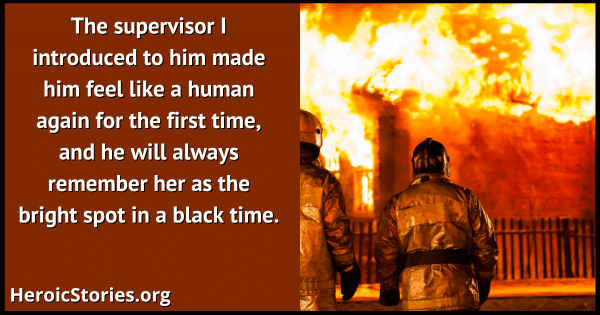by Rick Walker
British Columbia, Canada

The summer of 2003 in central British Columbia, Canada was a summer of fire. The firestorm resulted in the evacuation of 90,000 people for six weeks, burning out hundreds of homes and devastating lives. In Canada, Emergency Social Services is part of our Provincial Emergency Program. ESS and PEP are volunteers who work their regular jobs and then work eight to twelve hours volunteering when and where needed.
One local resident, “Fred”, was a railroad employee. While the fires burned, he spent several weeks out working for the railroad. His upcoming birthday present to himself was a mortgage-burning; his home would be paid off one week before his birthday. As he rode the train home, it passed down the valley where he lived — and he saw his home and possessions go up in flames as he rode by.
Evacuees are encouraged to register with ESS. They don’t have to accept aid, but it helps family members get in contact with them. As requested, Fred registered. We recommended he return daily to check for messages, and we offered aid every day, which he refused. He said, “I’m staying with friends. Others need it more.”
After two weeks, Fred learned that ESS could help his hosts with food. He thought he could help them out by applying for them. The clerk he talked to thought he was trying to abuse the system, refused him, and hinted that he was dishonest. This was too much for Fred, and he lost his temper. He yelled at the clerk. Security detained him and called the RCMP.
I found him surrounded by four security people and very upset. As a PEP director, I sent the security away to find out what was going on. Remember, this man is an evacuated railroad worker. He has tattoos, long hair, and is still wearing worn but clean work clothes.
The stress was too much, and Fred was on the edge of breaking down. I took him outside, found him a tree to lean against, gave him a bottle of water, and told him to stay put for a minute. I went inside and found an ESS supervisor.
She gathered forms, and I took her to Fred outside. She sat with him almost an hour. She put her arm around him, talked, and listened to him. She filled out forms and had him sign them. He left with a handful of forms for food, toiletries, and clothing and with his head held high (if a bit dazed).
What she did was far outside her normal duties. She did what had to be done in a no-nonsense, git ‘er done kind of way.
A month after the last evacuee went home, I met Fred again on the street. He stopped and thanked me. He said it was the worst time of his life, but it was when he saw the best in people. The supervisor I introduced to him made him feel like a human again for the first time, and he will always remember her as the bright spot in a black time.
Podcast: Play in new window | Download (Duration: 4:20 — 3.3MB)


At one time I worked as someone who assisted people when they had been affected by a disaster.
I know that most of the time – what people need more than anything is to be heard. Everyone needs someone to listen to them, to be given the opportunity to vent and to be provided hope that there may be some help available.
Isn’t that what we all need?
Rick, my friend, if you are still out there, I have a word for you. What you did is *beyond* words, because you had the insight and compassion that defused this entire situation. How different recent tragic events would have been if someone like yourself had DE-escalated instead of escalating. Fred may credit the ESS supervisor, but I credit you, the real hero of this story. God bless you.
‘Never judge a book by it’s cover’ was a saying my mum used often….. Wonderful story